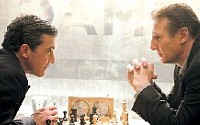
scr Richard Eyre, Charles Wood
with Liam Neeson, Antonio Banderas, Laura Linney Romola Garai, Pam Ferris, Abigail Canton, Amanda Drew, Laurence Richardson, Kas Graham
release UK Oct.08 lff, US 3.Dec.08
08/UK 1h30

This isn't a game: Banderas and Neeson



TORONTO FILM FEST

 Filmmaker Eyre turns his attention to another story of obsession with this twisty drama set in England and Italy, but the tone is too uneven for us to get on board. And there are a couple of major plot points that are badly mishandled, leaving us feeling cheated.
Filmmaker Eyre turns his attention to another story of obsession with this twisty drama set in England and Italy, but the tone is too uneven for us to get on board. And there are a couple of major plot points that are badly mishandled, leaving us feeling cheated.
Peter (Neeson) is devastated when his wife Lisa (Linney) leaves him. But this is nothing compared to the rage that consumes him when he discovers that she'd been having an affair with Ralph (Banderas), a Spaniard living in Milan. So off he goes to confront him, or worse, and as the tension builds we wonder what he's capable of. Meanwhile, their grown daughter Abigail (Garai) starts to worry, following Dad to Italy to figure out what's going on and to convince him to just let it go.
Of course, there's rather a lot more to this story, but extremely important revelations about both Lisa and Ralph emerge much later in the plot. These are key facts that sharply turn the film in a different direction than where Eyre had been leading us through extremely selective editing and musical choices. In other words, we feel like we've been had. And even an emotional denouement can't rescue things.
That said, there are things that make the film worth watching. Neeson gives a quietly slow-burning performance that sometimes drifts into all-out thriller territory but always maintains an emotive edge. Banderas is effective as a man who isn't what he appears to be. And Linney is lovely in a role that's mainly limited to flashbacks and fantasies. Garai even registers strongly in her underwritten part, adding an internal energy that makes Abigail intriguing.
But the real problem here is that Eyre doesn't seem clear about which film he's trying to make. He deploys Stephen Warbeck's florid score as if this is a Hitchcockian thriller, although nothing in the direction hints at anything ominous. And when he finally starts revealing what's actually happening, we think it's a joke, simply because it's so sudden and inexplicable, with very few hints. There's some great material in here on strongly evocative themes, but we've got to slog through rather too much melodrama to get there.
 |
themes, strong language | 23.Oct.08 lff |

 Still waiting for your comments ... don't be shy.
Still waiting for your comments ... don't be shy.
HOME | REVIEWS | NEWS | FESTIVAL | AWARDS | Q&A | ABOUT | TALKBACK